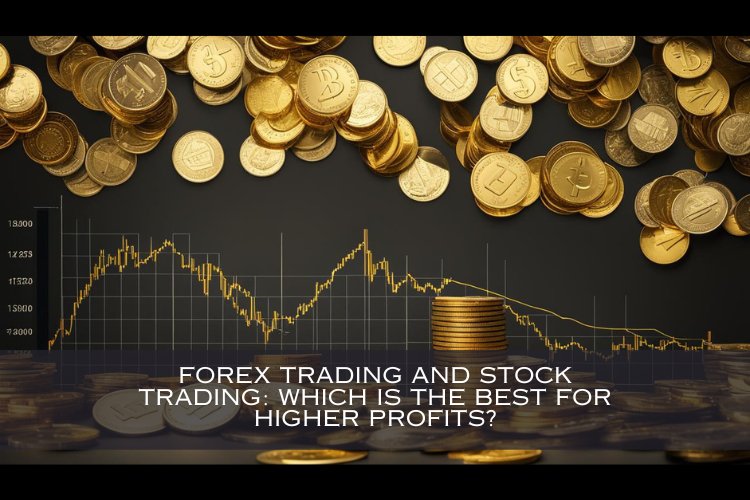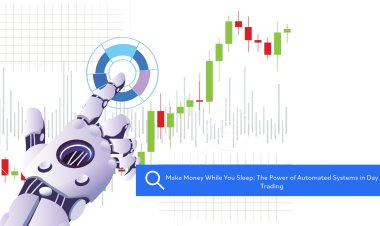Forex trading and stock trading: which is the best for higher profits?
Dive into the world of Forex Trading and Stock Trading. Discover which suits your financial goals best for potentially higher profits in the market.

Forex trading and stock trading: which is the best for higher profits?
Welcome to our article on forex trading and stock trading. If you're looking to invest your money to achieve higher profits, you might be contemplating which trading avenue to pursue. Is forex trading a better option, or should you be exploring the realm of stock trading?
With both forex trading and stock trading having their pros and cons, it can be challenging to choose between the two. In this article, we'll explore the different aspects of forex trading and stock trading to help you make an informed decision.
Key Takeaways:
- Choosing between forex trading and stock trading can be tough, but understanding the basics of each can help you make an informed decision.
- Both forex trading and stock trading have their own unique attributes and benefits, and the decision depends on individual financial goals and preferences.
- Effective trading strategies, risk management, and market analysis are crucial for achieving higher profits in both forex trading and stock trading.
- Choosing the right broker is essential, and factors such as reputation, regulatory compliance, and trading platform features should be considered.
- Market volatility is inevitable, and traders need to adopt suitable risk management strategies to minimise losses and maximise profits.
Understanding forex trading
Forex trading, also known as foreign exchange trading, involves buying and selling currency pairs online. It has become increasingly popular due to its accessibility and potential for high profits.
Currency trading is done through forex brokers, who provide traders with a trading platform to monitor and execute trades. The forex market is open 24/5, allowing traders to participate from anywhere in the world at any time.
Online trading has made forex trading accessible to anyone with an internet connection, regardless of their location or experience level.
The Role of Forex Brokers
Forex brokers act as intermediaries between traders and the forex market, ensuring that trades are executed quickly and accurately. They also provide traders with essential tools and resources, such as real-time market data and analysis.
When choosing a forex broker, it is crucial to select a reputable and regulated broker that offers competitive spreads, low fees, and reliable customer support.
The Importance of a Reliable Trading Platform
Effective trading depends on the trading platform that the forex broker provides. It should have advanced charting tools, customizable indicators, and user-friendly features.
A reliable trading platform can help traders make informed decisions and maximise their profits.
|
Advantages of Forex Trading |
24/5 market accessibility |
High liquidity |
Leverage options |
|
Disadvantages of Forex Trading |
Highly volatile market |
Requires significant research and analysis |
High risk of losses |
Overall, forex trading offers immense potential for profit, but it requires a thorough understanding of the market and reliable tools and resources.
Exploring stock trading
Stock trading involves buying and selling shares of ownership in publicly traded companies. Investors purchase stocks with the hopes of making a profit, either through price appreciation or dividend payments.
The stock market is the collection of exchanges where stocks are bought and sold, such as the New York Stock Exchange (NYSE) and the Nasdaq Stock Market. Stock market trading involves analysing market trends, company performance, and economic indicators to make informed investment decisions.
Stock brokers act as intermediaries between investors and the stock market, executing trades on their behalf. They provide valuable guidance and advice to investors, helping them navigate the complex world of stock investing.
The Stock Exchange is the platform where stocks are traded. It provides a transparent and regulated marketplace for investors to buy and sell stocks.
Having a reliable trading platform is crucial for successful stock trading. It should be user-friendly, provide real-time market data, and offer tools for analysis and research. Examples of popular trading platforms include E*Trade, TD Ameritrade, and Robinhood.
Comparing stock trading and forex trading
While both stock trading and forex trading involve buying and selling assets in different markets, their fundamental differences set them apart. The stock market is typically less volatile than the forex market, with smaller price fluctuations and fewer opportunities for high profits. However, it offers long-term investment opportunities and can be a reliable source of income for investors.
The forex market, on the other hand, is more volatile and offers greater opportunities for high profits, but it also carries higher risks. Currency trading involves exchanging one currency for another with the aim of making a profit from fluctuations in exchange rates. Forex brokers act as intermediaries in this market, providing traders with access to the market and facilitating transactions.
Choosing between stock trading and forex trading ultimately depends on individual financial goals and risk tolerance. Both require careful consideration and an understanding of market dynamics and trading strategies.
Different trading strategies
Day trading and swing trading are two of the most commonly used trading strategies in both forex trading and stock trading. While both of these approaches are designed to help traders achieve their financial goals, they differ in terms of their timelines, goals, and risk management techniques.
Day Trading
Day trading involves buying and selling financial assets within a single trading day, usually closing all trading positions before the market closes. Traders engaging in day trading typically rely on technical analysis tools such as charts, indicators, and patterns to identify short-term trends and make quick profits.
|
Day Trading Pros |
Day Trading Cons |
|
Fast-paced and exciting |
Requires a high level of screen time and attention |
|
Can generate high profits in a short amount of time |
Can lead to impulsive decision-making and emotional trading |
|
Allows for quick decision-making |
High risk of loss due to market volatility |
Day traders must be willing to take on high amounts of risk and be able to handle the stress associated with making fast-paced trading decisions.
Swing Trading
Swing trading, in contrast, involves holding financial assets for several days to a week, aiming to capture medium-term market movements. Traders engaging in swing trading often use technical and fundamental analysis tools to identify potential entry and exit points, enabling them to profit from market fluctuations.
|
Swing Trading Pros |
Swing Trading Cons |
|
Less screen time and less intense decision-making |
May require more patience and discipline |
|
Greater potential for profits due to capturing medium-term trends |
May require the use of stop-loss orders for risk management |
|
Can lead to more informed and strategic decisions |
May not generate quick profits as in day trading |
Swing traders can benefit from a more relaxed trading style and are better suited to those who prefer not to engage in high-stress, fast-paced trading scenarios.
Trading Tips
Regardless of the trading strategy you choose, there are some essential trading tips that can help you maximise your profits:
- Develop a sound trading plan.
- Set realistic financial goals.
- Always use stop-loss orders to manage risk.
- Keep emotions in check and avoid impulse trading.
- Stay up-to-date on market news and economic events.
By keeping these tips in mind and selecting an appropriate trading strategy, you can achieve your financial goals in the forex trading and stock trading markets.
Analysing the Markets
Market analysis is a crucial aspect of forex trading and stock trading. It involves evaluating market trends, identifying patterns, and predicting future price movements. There are two main approaches to market analysis: technical analysis and fundamental analysis.
Technical Analysis
Technical analysis utilises charts, indicators, and patterns to analyse market trends. Technical analysts believe that all relevant information is reflected in market prices and that patterns and trends can be identified to make informed trading decisions. Some common technical analysis tools include:
|
Tool |
Description |
|
Candlestick charts |
A chart that displays the open, high, low, and close for each trading period. |
|
Moving averages |
An average of price data over a specific period, used to identify trends. |
|
Relative strength index (RSI) |
A momentum indicator that measures the strength of a stock's upward or downward price movements. |
Technical analysis can be a valuable tool for predicting short-term price movements and identifying entry and exit points for trades. However, it's important to note that technical analysis is not foolproof and that past performance is not indicative of future results.
Fundamental Analysis
Fundamental analysis evaluates the economic, financial, and other qualitative and quantitative factors that affect a company's stock or a currency's value. Fundamental analysts believe that analysing a company's financial statements, industry trends, and macroeconomic data can provide insights into the company's future prospects and the potential for growth.
Some common fundamental analysis tools include:
- Earnings reports
- Profit margins
- PE ratio
- Interest rates and inflation data
Using fundamental analysis can be valuable for long-term investment strategies, as it provides a comprehensive view of a company's potential and the factors that may affect its future performance. However, it's important to recognise that fundamental analysis is subject to interpretation and that unforeseen events or sudden market shifts can impact a company's performance.
Trading Tips for Effective Analysis
Regardless of the analysis approach you choose, there are several trading tips that can help you maximise your profits:
1. Stay up-to-date with market news and events.
2. Identify key support and resistance levels.
3. Set clear entry and exit points for trades.
4. Use stop-loss orders to minimise losses.
5. Be patient, and avoid impulsive trading.
Choosing a Broker
One of the most important decisions traders make when entering the forex or stock market is choosing a suitable broker. A broker acts as the middleman between the trader and the market, providing access to trading platforms and market quotes to execute trades. Here are some factors to consider when choosing a broker:
|
Factor |
Forex Broker |
Stock Broker |
|
Regulatory Compliance |
Regulated by CFTC, NFA, IFMRRC or SEC |
Regulated by FINRA or SEC |
|
Reputation |
Look for brokers with established track records, good reviews, and high ratings from reputable sources |
Choose brokers with excellent customer satisfaction ratings, longevity, and successful records |
|
Trading Platform |
Ensure that the platform is user-friendly and offers reliable and fast order execution, technical analysis tools, and customization options |
Verify that the platform is easy to use, offers real-time quotes, diverse order types, and charting tools |
|
Customer Support |
Check that the broker provides quality customer support, including phone, email, or live chat options available 24/7. Also, consider the availability of educational resources and market analysis tools |
Make sure the broker offers responsive customer service, with both phone and online options. Additionally, check for access to research materials, investment reports, and market analysis tools |
Some brokers offer both forex and stock trading, while others specialise in one area. Before choosing a broker, traders should research and compare different options, read reviews and ratings, and test out the trading platform to ensure it meets their needs and preferences. Also, keep in mind that some brokers offer demo accounts, which provide a risk-free way to try out their services before committing to a live account.
Risk Management and Market Volatility
Trading involves taking risks, and it is crucial to manage those risks to avoid losing money. One way to manage risk is to use contracts for difference (CFDs) and options. With CFDs, instead of buying the underlying asset, you speculate on the price movement of the asset, which is a more flexible and cost-effective way to trade. Options trading, on the other hand, gives you the right to buy or sell assets at a predetermined price, providing a level of protection against market volatility.
“The use of CFDs and Options provides a degree of risk management in trading, but it is still important to develop a sound trading strategy and apply risk management principles to minimize losses.”
Some essential risk management tips to consider when trading include:
- Establishing a stop-loss order to limit your losses if the market moves against you
- Diversifying across different markets, assets, and trading strategies to spread the risk
- Staying informed about the latest market trends and news to make informed trading decisions
- Avoid overtrading or trading with too much leverage, which can increase your risk exposure.
Market volatility is an inherent feature of trading, and it is crucial to understand how to manage it effectively. One way to mitigate volatility risk is to use technical analysis and fundamental analysis to identify price trends and market conditions. Technical analysis involves analysing charts, indicators, and patterns to predict price movements. Fundamental analysis involves assessing economic and company-specific factors to identify the intrinsic value of an asset. A combination of these two methods can help you make better trading decisions and reduce your risk exposure.
|
Features |
CFD Trading |
Options Trading |
|
Flexibility |
High |
Low |
|
Leverage |
High |
Low |
|
Trading Costs |
Lower |
Higher |
|
Risk Management |
Effective |
More effective |
In conclusion, while trading involves taking risks, it is critical to manage those risks effectively to avoid losing money. The use of risk management tools such as CFDs and options, along with a sound trading strategy and informed trading decisions, can help you minimise losses and maximise profits in volatile markets.
The Foreign Exchange Market vs. the Stock Market
Both the foreign exchange (forex) market and the stock market offer the potential for high profits, but they are vastly different in many ways. Understanding the differences between these markets is essential to making informed trading decisions and developing effective trading strategies.
Market size and liquidity
The forex market is the largest financial market in the world, with an average daily turnover of over $6 trillion. In comparison, the stock market has an average daily turnover of around $200 billion. This means that the forex market has significantly higher liquidity, making it easier to enter and exit trades without affecting market prices.
Trading Hours
The Forex Market is a 24-hour market, operating five days a week. This means that traders can access the market at any time, making it easier to fit trading around other commitments. In contrast, the stock market is open for around eight hours a day, five days a week, and is closed on weekends and public holidays.
Trading Strategies
Trading strategies in the forex market and the stock market differ due to the varying market dynamics. In the forex market, traders can use leverage to increase their potential profits and take advantage of small price movements. In contrast, the stock market offers trading opportunities based on company news, earnings reports, and other fundamental factors.
Market Dynamics
The forex market is a decentralised market, meaning that there is no central exchange or regulator. This can make the market vulnerable to manipulation and scams, and traders need to be cautious when choosing brokers and trading platforms. In contrast, the stock market is heavily regulated, with strict rules and oversight to protect investors.
Conclusion
Ultimately, whether forex trading or stock trading is better for achieving higher profits depends on individual financial goals and preferences. Both markets offer unique advantages and risks, and success in trading requires a robust trading strategy, proper risk management, and a reliable broker and trading platform. By understanding the differences between these markets, traders can make informed trading decisions and develop effective strategies for maximising profits.
In conclusion, both forex trading and stock trading offer excellent opportunities for higher profits. However, the choice ultimately depends on individual financial goals and preferences.
Trading Strategies
To maximise profits in either market, it is crucial to have a robust trading strategy in place. Day trading and swing trading are popular strategies for both forex trading and stock trading.
Choosing a Broker
Choosing the right broker is instrumental in achieving success in trading. Ensure your broker has a good reputation, is regulatory compliant, and provides a reliable trading platform with excellent customer support.
Market analysis and risk management
Conducting proper market analysis through technical and fundamental analysis is crucial for informed trading decisions. Additionally, implementing sound risk management practices, such as CFD and option trading, helps manage market volatility.
Regardless of the market, higher profits are achievable with a disciplined approach and an unwavering commitment to a trading strategy.
Thank you for reading, and good luck with your trading endeavours!
FAQ
Is forex trading or stock trading better for higher profits?
Both forex trading and stock trading have the potential for higher profits, but the choice ultimately depends on individual preferences, risk tolerance, and trading strategies.
What is forex trading?
Forex trading, also known as foreign exchange trading, involves buying and selling currencies in the global market. Traders speculate on the fluctuation of exchange rates to make a profit.
How does forex trading work online?
Through a trading platform that Forex brokers provide, one can conduct forex trading online. Traders can access the platform from anywhere with an internet connection and execute trades accordingly.
What is stock trading?
Stock trading involves buying and selling shares of publicly traded companies in the stock market. Traders aim to profit from the price movements of individual stocks.
How does stock trading work?
Stock trading takes place on the stock market, where buyers and sellers trade shares. Investors analyse company performance and market trends to make informed decisions about buying or selling stocks.
What are day trading and swing trading?
Day trading involves buying and selling financial instruments within the same trading day to take advantage of short-term price fluctuations. Swing trading, on the other hand, focuses on capturing medium-term trends over a few days to weeks.
How can I analyse the markets in forex and stock trading?
Market analysis in both forex and stock trading involves using technical analysis tools such as charts, indicators, and patterns, as well as fundamental analysis, which evaluates economic factors and company performance.
How do I choose the right broker for trading?
When selecting a broker for Forex or stock trading, consider factors such as reputation, regulatory compliance, trading platform features, customer support, and the availability of suitable trading instruments.
How can I manage risk in trading?
Risk management is essential in trading. Techniques like setting stop-loss orders, diversifying investments, and following a trading plan can help minimise potential losses. Education and practice are also important.
What are the differences between the foreign exchange market and the stock market?
The foreign exchange market is decentralised, has high liquidity, operates 24 hours a day, and focuses on currency pairs. The stock market, on the other hand, is centralised, has specific trading hours, offers various stocks, and is influenced by company performance and economic factors.
TradeFxP Features
If you choose to be a self-employed retail trader, here are a few things we offer:
- The best trading platform
- No Requotes
- Lowest Spreads
- High-level liquidity
- Interbank connectivity
- Pure STP/DMA/ECN
- Free signals
- Best support
- Crypto Wallet and withdrawals / Deposits (USDT)
- Robust CRM
- TradeFxP wallet
- Once click withdrawal
- Multiple payment options
- Local offices to walk in
- Free VPS
- Free Video Chat / Virtual Meetings
- And many more…
If you choose to be a part of our managed account programme,
- All of the above +
- 1-2% Daily Profits
- High-level risk management
- Capital protection
- Only 30% of the capital used
- Negative balance protection
- Our fee is from the profits only
- Monthly profit withdrawal
- Wallet system – Use it like Phonepe, or Google Pay
- Crypto wallet and withdrawals / Deposits (USDT)
- Live monitoring
- MyFxbook Live monitoring
- Copy Trading
- And many more…
Optional: If you do not withdraw your profits for 2 months, our system will use those profits to trade and will keep your 100% capital safe and secure for margin purposes. This is optional, and if you choose not to be a part of it, you can withdraw your profits from the first month itself.
Why 1-2% daily? Can't your managed forex account earn more?
Yes, we can! Remember: greed may be good in the beginning, but in the end, it will destroy everything. You and I know that! Many droplets make an ocean! Join the Managed Account Programme and sit back for six months, then look at your account. You'll see that our strategy is good and the best. Do you know what I mean?
If you choose to be a part of us as an introducing broker (IB) or channel partner,
- Industry-best rebates
- Local Office support
- Staff support
- Marketing support
- Marketing materials
- And many more…
Having said that,
You can join our Forex Managed Account programme and earn 1-2% profits daily. See for yourself by clicking the below link.
Have a great journey, and may you catch some big waves on your way to prosperity!
To see Ai Forex Trading for real, use these credentials.
- Low-risk strategy:
- Mt4: 112018
- Pw: Allah@101
- Server: TradeFxP live,
1. To read why you should be with us, click here.
2. To open an account, click here.
3. To see our regulation certificate, click here.
4. To see our news with the IFMRRC, click here.
5. For claims, click here.
6. For the main site, click here.
7. For blogs and articles, click here.
8. Main Website: www.TradeFxP.com



 admin
admin 










